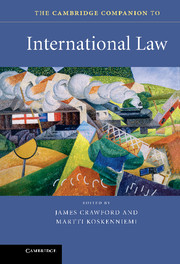Book contents
- Frontmatter
- Contents
- Preface
- Notes on contributors
- Introduction
- Part I The contexts of international law
- Part II International law and the state
- Part III Techniques and arenas
- Part IV Projects of international law
- 12 Constituting order
- 13 Legitimating the international rule of law
- 14 Human rights in disastrous times
- 15 Justifying justice
- 16 Regulating trade, investment and money
- 17 Divided against itself
- 18 Conserving the world’s resources?
- Guide to electronic sources of international law
- International law chronology
- Select guide to further reading
- Index
- References
12 - Constituting order
from Part IV - Projects of international law
Published online by Cambridge University Press: 05 July 2015
- Frontmatter
- Contents
- Preface
- Notes on contributors
- Introduction
- Part I The contexts of international law
- Part II International law and the state
- Part III Techniques and arenas
- Part IV Projects of international law
- 12 Constituting order
- 13 Legitimating the international rule of law
- 14 Human rights in disastrous times
- 15 Justifying justice
- 16 Regulating trade, investment and money
- 17 Divided against itself
- 18 Conserving the world’s resources?
- Guide to electronic sources of international law
- International law chronology
- Select guide to further reading
- Index
- References
Summary
Introduction
The proper relation between law and order has long been a contested one. Attempting to determine the proper relation between international law and international order is an even more difficult task. Does international law exist to create and maintain international order? Should this be one of the functions of international law? If so, what kind of order is international law designed to secure and maintain? Does constituting order always take priority over all other goals, values or interests? Who decides? These are particularly difficult questions for international lawyers, because international law has predominantly been understood as a means of governing relations between sovereign states. In this view, states are the authors of law and the bearers of pluralism. International law only exists to the extent that sovereign states consent to be bound by specific obligations. International law, like private law, is thus portrayed as a system for governing relations between equals. In the case of international law, the equality of subjects plays an even more fundamental role than in domestic legal systems, where the idea that agreements must be honoured finds a guarantor in the state. Because international law is a system in which there is no higher guarantor, international jurisprudence is strongly shaped by the notion of consent and by the idea that law only exists to bind states to their commitments. According to this view, international lawyers fulfil their function when they find ways for these alienated entities to express their national interests or their instrumental objectives in the law they bring into being.
- Type
- Chapter
- Information
- The Cambridge Companion to International Law , pp. 271 - 289Publisher: Cambridge University PressPrint publication year: 2012
References
- 3
- Cited by



